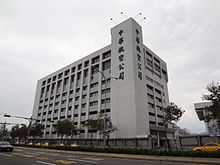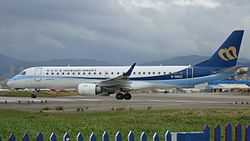Mandarin Airlines
 | ||||
| ||||
| Founded | June 1, 1991 | |||
|---|---|---|---|---|
| Hubs |
Taipei Songshan Airport Taichung Airport | |||
| Focus cities | Kaohsiung International Airport | |||
| Frequent-flyer program | Dynasty Flyer | |||
| Airport lounge | Dynasty Lounge | |||
| Alliance | SkyTeam (Affiliate) | |||
| Fleet size | 8 | |||
| Destinations | 34 (including charter flights) | |||
| Parent company | China Airlines | |||
| Headquarters | Songshan District, Taipei, Republic of China | |||
| Key people |
Samuel P. Lin (Chairman) | |||
| Website | mandarin-airlines.com/english/index.html | |||

Mandarin Airlines (Chinese: 華信航空; pinyin: Huáxìn Hángkōng) is an airline based in Taipei, Republic of China (Taiwan). The Taiwanese carrier operates domestic and regional international flights, while its parent company focusses on the inter-national/-continental operations. Charter services are also operated by the company. Its other main hub is the Taichung Airport.
History

Mandarin Airlines was established on 1 June 1991, and was initially a joint venture by China Airlines (67%) and CTBC Holding (33%); the Chinese name of the company is formed by the combination of the two.[1] The establishment of Mandarin Airlines is closely related to the political status of Taiwan. At the time, Mandarin Airlines' parent company, China Airlines, still served as the flag carrier of the Republic of China, with the flag of the Republic of China a part of its livery. Denying the existence of the Taipei government, the People's Republic of China hence attempted to boycott the international presence of China Airlines, using trade barriers to achieve its political goal. However, PRC's objection did not extend to other Taiwanese carriers not carrying the ROC flag. As a way to work around these limits, Mandarin Airlines was founded while China Airlines maintained its role as the flag carrier.
On 16 October 1991, Mandarin Airlines started operations with direct flights from Taipei to Sydney in Australia. The next step was the opening of a direct air route to Vancouver in Canada on 7 December 1991. Thus, Mandarin Airlines became the ROC's first airline to fly direct to Australia and Canada. The China Trust Group pulled its investment in Mandarin Airlines on 31 October 1992, turning the airline into a company virtually wholly owned by China Airlines (90.05%) by December 1992. Also, Mandarin Airlines' role was changed to that of a primary domestic and short-range intra-regional airline,[1] after parent China Airlines was able to re-establish its emphasis on international routes, due to a new livery that did not include the national flag, and thus faced less objection from the PRC.
On 8 August 1999, China Airlines formally merged its subsidiary, Mandarin Airlines, with Formosa Airlines under the Mandarin name. Mandarin took over Formosa's domestic operations and aircraft while Mandarin's fleet and most of its international flights were transferred to China Airlines.[1] In early 2000, the airline bought 5 Dornier 228 from Uni Air to fly outlying routes. These planes were sold to Daily Air in 2005, a helicopter carrier in Taiwan which had won the bid to fly these money-losing routes.
Mandarin Airlines is owned by China Airlines (93.99%) and has 630 employees (as of March 2007).[2]
Corporate affairs
The headquarters is currently in Songshan District, Taipei.[3]
Previously the headquarters was in a different building in Taipei.[4]
Logo
The airline uses Hai Tung Ching (Chinese: 海東青; pinyin: Hǎidōngqīng), a gyrfalcon from a Chinese legend, as its logo.[5]
Destinations
Mandarin Airlines operates the following services as of November 2012 [6] The mainland Chinese destinations may include scheduled charter service or indirect routing which transit through non-Chinese countries.
Current
- Hualien - Hualien Airport
- Kaohsiung - Kaohsiung International Airport Hub
- Kinmen - Kinmen Airport
- Makung - Magong Airport
- Taichung - Taichung Airport Focus city
- Taipei:
- Songshan Airport Hub
- Taoyuan International Airport
- Taitung - Taitung Airport
- Changsha - Changsha Huanghua International Airport
- Fuzhou - Fuzhou Changle International Airport
- Hangzhou - Hangzhou Xiaoshan International Airport
- Lijiang - Lijiang Sanyi Airport
- Nanjing - Nanjing Lukou International Airport
- Ningbo - Ningbo Lishe International Airport
- Shantou- Jieyang Chaoshan Airport
- Shenyang - Shenyang Taoxian International Airport
- Xiamen - Xiamen Gaoqi International Airport
- Zhengzhou - Zhengzhou Xinzheng International Airport
- Ishigaki - New Ishigaki Airport
- Osaka - Kansai International Airport charter
- Tokyo - Narita International Airport
- Kalibo - Kalibo International Airport
- Laoag - Laoag International Airport
- Cebu - Mactan-Cebu International Airport (begins January 8, 2015)[7] charter
Former
- Brisbane - Brisbane Airport
- Sydney - Kingsford Smith International Airport
Codeshare agreements
As of November 2012, Mandarin Airlines has codeshare agreements with the following airlines:
Fleet


The Mandarin Airlines fleet includes the following aircraft:
| Aircraft | In fleet | Orders | Seats | Note | ||
|---|---|---|---|---|---|---|
| C | Y | Total | ||||
| ERJ-190 | 8 | 2 | 0 | 104 | 104 | Leased from GECAS |
| Boeing 737-800 | 1 | 0 | 8 | 150 | 158 | Operated on May 20, 2013 and leased from CAL.[8] |
Mandarin Airlines announced the lease of 3 Embraer E-190s and 5 Embraer E-195 aircraft from GE Commercial Aviation Services. The aircraft will be used on the dedicated connection flights between Kaohsiung International Airport and Taiwan Taoyuan International Airport as well as shorthaul routes in Asia, and replace the fleet of Fokker 50 and Fokker 100s.[9] The first of 8 leased Embraer E-190/195s was delivered to the airline in May 2007, the first to a Taiwanese airline.[10] The Embraer E-190s feature a refreshened livery. On October 27, 2009, Mandarin Airlines retired its last Fokker 100 aircraft (B12291), ending this type's 14-year serving era.[11]
Previously operated aircraft include:
Incidents and accidents

- China Airlines Flight 642 crashed while landing at Hong Kong International Airport in 1999, resulting in three passenger deaths. The flight was operated by a Mandarin Airlines McDonnell Douglas MD-11.
On August 17, 2012, Mandarin Airlines Flight 369 experienced a runway excursion during heavy rain due to improper landing and deceleration technique on runway 20 at Magong airport. The ERJ-190 aircraft was intentionally steered off the side of the runway and struck a the base of four concrete runway lights causing the nose gear to collapse. No injuries were reported for the accident.[12]
See also
References
- ↑ 1.0 1.1 1.2 "About Us." Mandarin Airlines. Retrieved on March 7, 2010.
- ↑ "Directory: World Airlines". Flight International. 2007-04-10. p. 47.
- ↑ "Home." Mandarin Airlines. Retrieved on August 8, 2014. "台北總公司: 10548台北市敦化北路405巷123弄3號 Head Office: No.3, Alley 123, Lane 405 Tunhwa N. Rd., Taipei, 10548 Taiwan"
- ↑ "Contact Us." Mandarin Airlines. Retrieved on March 15, 2010. "台北總公司: 105台北市民生東路三段134號13樓."
- ↑ "Our business mark and concept of operations." Mandarin Airlines.
- ↑ "Our Flight Destinations." Mandarin Airlines.
- ↑ http://airlineroute.net/2014/12/09/ciae-ceb-jan15/
- ↑ "華信航空 6月起迎接B738客機 提升國際線服務". 旅報新聞網. 2013-02-04.
- ↑ Mandarin Airlines News
- ↑ Air Transport World 15 May 2007
- ↑ 華信FK-100機隊 光榮除役
- ↑ http://news.aviation-safety.net/2013/09/14/report-long-touchdown-of-erj-190-on-wet-runway-causes-runway-excursion-and-nosegear-collapse/
External links
| Wikimedia Commons has media related to Mandarin Airlines. |
| ||||||||||||||||||||||||||||
| ||||||||||||